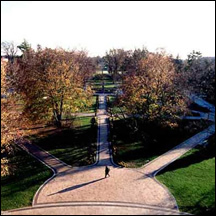
Just as American voters as a whole have become more politically polarized, a new survey released this week indicates college students have, too.
Call it Red Quad, Blue Quad.
In an annual survey of first-year students at U.S. colleges and universities, a record number defined themselves at the political extremes of “far right” and “far left,” and the percentage of students who identified themselves as “middle of the road” fell to the lowest point in more than 30 years.
Those national trends also held true with freshmen at the University of Notre Dame, which was among the 440 baccalaureate colleges and universities that participated in the survey.
Conducted last fall, at the height of the 2004 presidential campaign, the survey found that 3.4 percent of students nationwide consider themselves on the far left, and 2.2 percent on the far right.
“Although these percentages are small, the changes between the 2003 and 2004 numbers – concurrent with the presidential election year – reflects the largest one-year shift in studentspolitical orientation in the 35 years that it has been included in the survey,” said Linda J. Sax, director of the survey and an associate professor of education at UCLA.
In addition, the percentage of freshmen identifying themselves as liberal (26.1) and conservative (21.9 percent) also was up over a year ago. The overall effect was to reduce the number of students characterizing themselves as middle of the road to 46.4 percent, down almost 4 percentage points from a year ago.
While Notre Dame students are more conservative than their peers nationwide, the trend on campus toward more political polarization was just as evident. The middle of the road category fell from 41.4 percent to 37.7 percent, while the far left and liberals grew by 2 percent (21.9 percent) and the far right and conservatives were up 1 percent (40.3 percent).
Not surprisingly, the survey also found that interest in politics among incoming college students is on the rise, with 34.3 percent of students nationwide indicating that keeping up to date with political affairs is a very important or essential life goal. This marks a substantial increase from that categorys record low of 28.1 percent among freshmen who entered in 2000 and is the highest level of political interest in a decade.
Notre Dame freshmen always have been much more interested in political affairs than their peers. Among this years incoming students, 51.8 percent said keeping up to date with politics was important or essential, a 1 percent increase over the previous class.
The survey also found that the percentage of students nationally who frequently discussed politics increased from 22.5 percent in 2003 to 25.5 percent last year, marking the highest point in more than a decade. Among Notre Dame students, there also was a 3 percentage point increase, from 34.3 percent to 37.8 percent.
By way of comparison, in 1966 more than 60 percent of freshmen valued keeping up with political affairs and about 33 percent discussed politics.
“The current indicators of political engagement are far lower than the peaks of the late 1960s,” Sax said, “but represent a noteworthy increase over the past four years, a shift we can safely attribute to the events surrounding Sept. 11, the war in Iraq and the recent U.S. presidential election.”
Now in its 39th year, “The American Freshman” survey is conducted by the Higher Education Research Institute at UCLAs Graduate School of Education&Information Studies. The 2004 report is based on the responses of 289,452 students, and the data have been statistically adjusted to reflect the responses of the 1.2 million first-time, full-time students entering four-year colleges and universities as freshmen.
Among other noteworthy observations drawn from the survey:
- Notre Dames freshmen came to the University overwhelmingly because of its academic reputation – 92 percent cited this factor, some 35 percentage points higher than students nationwide. Notre Dame freshmen also are right where they want to be. About 84 percent say the University was their top choice; that compares to 69.5 percent nationally.
- Notre Dame students oppose abortion and the death penalty more than their peers. Two-thirds at Notre Dame opposed legal abortion, versus 54 percent nationally, and 58 percent object to the death penalty, versus 33 percent nationally.
- Notre Dame freshmen are far less likely than their counterparts to condone casual sex. More than 46 percent of first-year students nationwide agreed with the statement, “If two people really like each other, its all right for them to have sex even if theyve known each other for only a very short time.” About 24 percent of Notre Dames students feel the same way.
- The Universitys first-year students smoke and drink beer less than the average. About 6 percent of college freshmen have smoked cigarettes in the last year (a 10-point drop over the past half-dozen years), compared with less than 1 percent at Notre Dame. Nationwide, 45 percent of students drank beer, compared with 38 percent among Notre Dame freshmen. Students at other institutions are more likely than Notre Dame students to support legalization of marijuana – 37.2 percent versus 25.5 percent.
TopicID: 9322